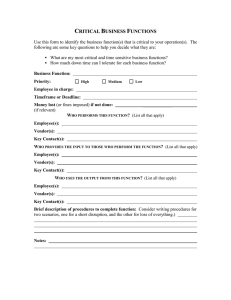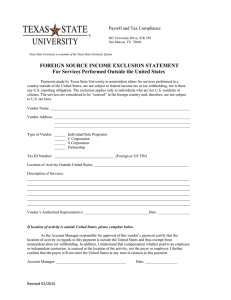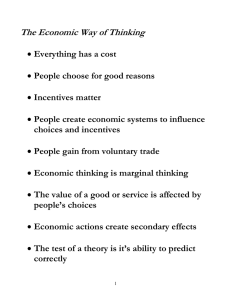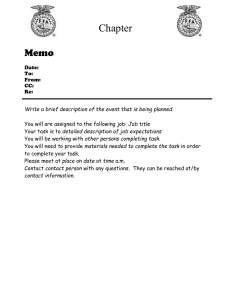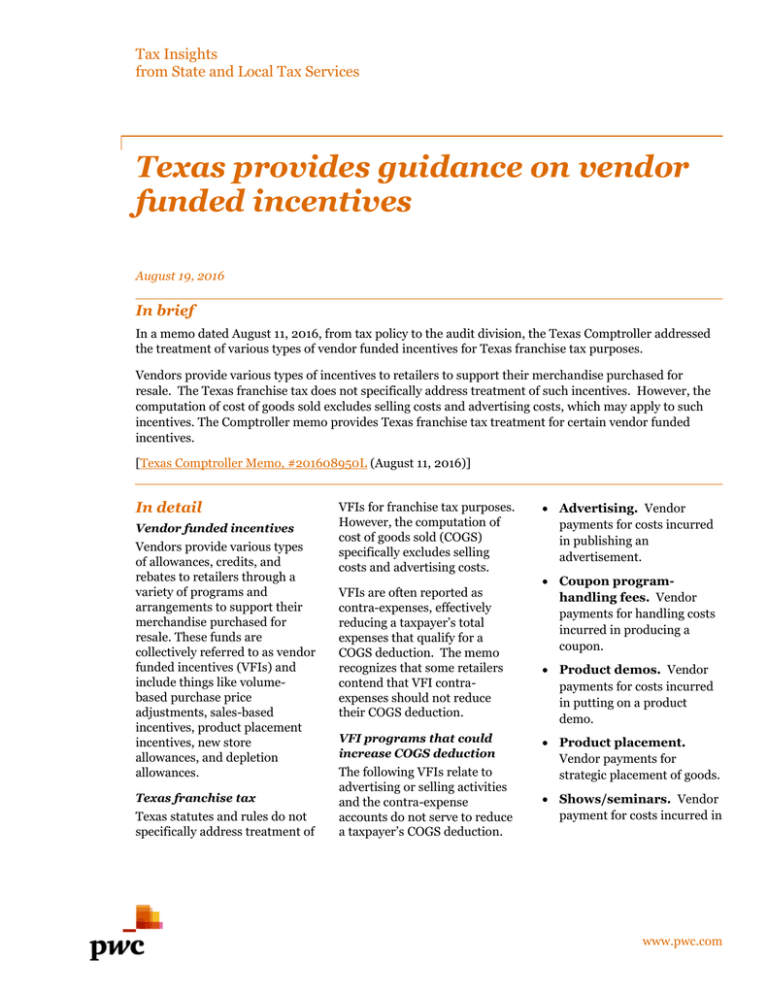
Tax Insights
from State and Local Tax Services
Texas provides guidance on vendor
funded incentives
August 19, 2016
In brief
In a memo dated August 11, 2016, from tax policy to the audit division, the Texas Comptroller addressed
the treatment of various types of vendor funded incentives for Texas franchise tax purposes.
Vendors provide various types of incentives to retailers to support their merchandise purchased for
resale. The Texas franchise tax does not specifically address treatment of such incentives. However, the
computation of cost of goods sold excludes selling costs and advertising costs, which may apply to such
incentives. The Comptroller memo provides Texas franchise tax treatment for certain vendor funded
incentives.
[Texas Comptroller Memo, #201608950L (August 11, 2016)]
In detail
Vendor funded incentives
Vendors provide various types
of allowances, credits, and
rebates to retailers through a
variety of programs and
arrangements to support their
merchandise purchased for
resale. These funds are
collectively referred to as vendor
funded incentives (VFIs) and
include things like volumebased purchase price
adjustments, sales-based
incentives, product placement
incentives, new store
allowances, and depletion
allowances.
Texas franchise tax
Texas statutes and rules do not
specifically address treatment of
VFIs for franchise tax purposes.
However, the computation of
cost of goods sold (COGS)
specifically excludes selling
costs and advertising costs.
VFIs are often reported as
contra-expenses, effectively
reducing a taxpayer’s total
expenses that qualify for a
COGS deduction. The memo
recognizes that some retailers
contend that VFI contraexpenses should not reduce
their COGS deduction.
VFI programs that could
increase COGS deduction
The following VFIs relate to
advertising or selling activities
and the contra-expense
accounts do not serve to reduce
a taxpayer’s COGS deduction.
• Advertising. Vendor
payments for costs incurred
in publishing an
advertisement.
• Coupon programhandling fees. Vendor
payments for handling costs
incurred in producing a
coupon.
• Product demos. Vendor
payments for costs incurred
in putting on a product
demo.
• Product placement.
Vendor payments for
strategic placement of goods.
• Shows/seminars. Vendor
payment for costs incurred in
www.pwc.com
Tax Insights
putting on a product show/
seminar.
VFI programs that could decrease
COGS deduction
The following VFIs are considered
sales-based incentives and if not
reported as revenue, are included in
the COGS calculation as a contraexpense, thus reducing a taxpayer’s
COGS deduction.
• Coupon program-face value.
Vendor payments for the face value
of coupons that are used to reduce
the selling price to the customer.
• Depletion allowance/volume
incentives. Vendor payments
received once a sales goal is
reached.
• Mark down funding. Vendor
payments received as part of an
exit strategy (i.e. phase out) of a
product that are used to reduce the
selling price to the customer.
• New item allowances. Vendor
payments for costs incurred in
getting a new item to the shelf.
• Sales based incentives. Vendor
payments received based on a
reduction in the selling price to the
customer.
• Temporary price reductions.
Vendor payments received as part
of a short-term promotion that are
used to reduce the selling price to
the customer.
The takeaway
Refund opportunities may exist for
VFI types that, according to the
Comptroller memo, relate to
advertising or certain selling activities.
The Comptroller states that the
guidance is meant to ‘clarify’ Texas
franchise tax treatment, which may
imply retroactive application.
Taxpayers should note that Texas has
a four-year statute of limitations.
The Comptroller memo leaves many
unanswered questions as it only
address certain VFIs. The memo does
not appear to take into consideration
how recipients of these funds treat
them for book or tax purposes, does
not address documentation
requirements, and provides no
direction regarding how to apply the
guidance to VFI programs not
specifically addressed in the memo.
The memo may leave many taxpayers
with a lack of clarity regarding the
treatment of their specific VFI
programs for Texas franchise tax
purposes.
Let’s talk
If you have any questions regarding Texas franchise tax treatment of vendor funded incentives, please contact:
State and Local Tax Services
Scott Fischer
Partner, Dallas
+1 (214) 754-7589
scott.w.fischer@pwc.com
Mark Holmes
Director, Dallas
+1 (214) 754-5296
mark.b.holmes@pwc.com
State and Local Tax Services—Retail and Consumer Industry
Barbara Coulter
Partner, Atlanta
+1 (678) 419-1697
barbara.coulter@pwc.com
Click here to access our library of past state and local tax Insights.
© 2016 PricewaterhouseCoopers LLP, a Delaware limited liability partnership. All rights reserved. PwC refers to the United States member firm, and may sometimes refer to
the PwC network. Each member firm is a separate legal entity. Please see www.pwc.com/structure for further details.
SOLICITATION
This content is for general information purposes only, and should not be used as a substitute for consultation with professional advisors.
At PwC, our purpose is to build trust in society and solve important problems. PwC is a network of firms in 157 countries with more than 208,000 people who are committed to
delivering quality in assurance, advisory and tax services. Find out more and tell us what matters to you by visiting us at www.pwc.com/US.
2
pwc


